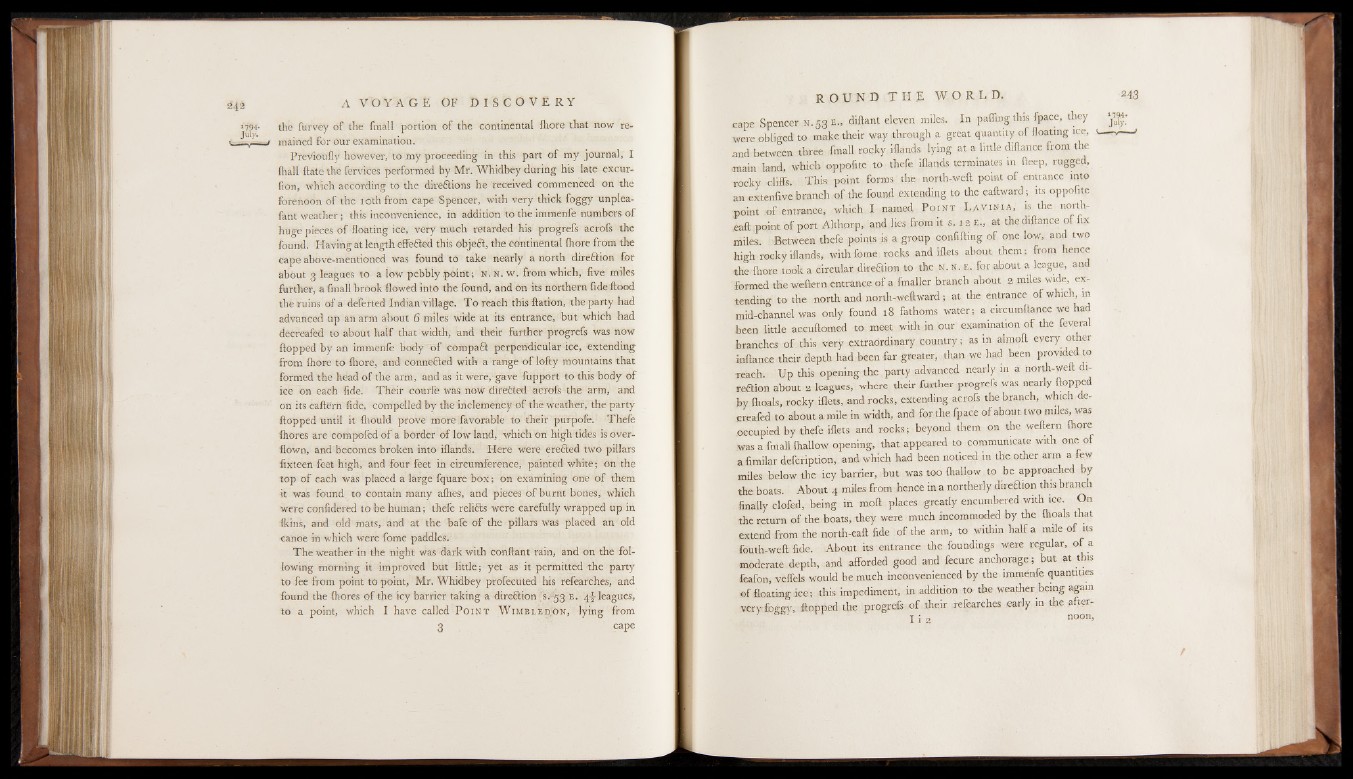
242
>794- the furvev of the fmall portion of the continental Ihore that now re-
■ - J- ui-f. • ma..m. ea for our examination.
PreVioufly however, to my proceeding in this part of my journal, I
lhall Hate the fervices performed by Mr. Whidbey during his late excur-
fion, which according to the directions he received commenced on the
forenoon of the 10th from cape Spencer, with very thick foggy unplea-
fant weather; this inconvenience, in addition to the immenfe numbers of
huge pieces of floating ice, very much retarded his progrefs acrofs the
found. Having at length effefted this objeft, the continental Ihore from the
Cape above-mentioned was found to take nearly a north direftion for
about 3 leagues to a low pebbly point; n . n . w . from which, five miles
further, a fmall brook flowed into the found, and on its northern fide flood
the ruins of a deferted Indian village. T o reach this ftation, the party had
advanced up an arm about 6 miles wide at its entrance, but which had
deCreafed to about half that width, and their further progrefs was now
Hopped by an immenfe body " o f compact perpendicular ice, extending
from Ihore to Ihore, and connected with a range of lofty mountains that
formed the head of the arm, and as it were, gave fupport to this body of
ice on each fide. Their courfe was now di retted acrofs the arm, and
on its eaftern fide, compelled by the inclemency of the weather, the party
flopped until it fhould prove more favorable to their purpofe. Thefe
fhores are compofed of a border of low land, which on high tides is overflown,
and becomes broken into iflands. Here were erefted two pillars
fixteen feet high, and four feet in circumference; painted white; on the
top of each was placed a large fquare box; on examining one of them
it was found to contain many afhes, and pieces of burnt bones, which
were confidered to be human; thefe relifts were carefully wrapped up in
fkins, and old mats, and at the bafe of the pillars was placed an old
canoe in which were fome paddles.
The weather in the night was dark with conflant rain, and on the following
morning it improved but little; yet as it permitted the party
to fee from point to point, Mr. Whidbey profecuted his refearches, and
found the fhores of the icy barrier taking a direftion fsSjg E . 4 ^ leagues,
to a point, which I have called P o i n t W i m b l e d o n , lying from
3 ' cape
cape Spencer N. 53 E.» diftant eleven miles. In paflingthis fpace, they
.were obliged to make their way through a great quantity of floating ice, 1---- s- 1
and between three fmall rocky iflands lying at a little diftance from the
■ main land, which oppofite to thefe iflands terminates in fleep, rugged,
rocky cliffs. This point forms the north-weft point of entrance into
an extenfive branch of the found extending to the eaftward; its oppofite
point of entrance, which I named Poin t L a v in ia , is the north-
eaft point of port Althorp, and lies frp'm it s. 12 e„ at the diftance of fix
miles. Between thefe points is a group confifting of one low, and two
high rocky iflands, with fome rocks and iflets about them; from hence
•the (liore took a circular direftion to the n. n. e . for about a league, and
formed the weftern. entrance of a finaller branch about 2 miles wide, extending
to the north and north-weftward; at the entrance of which, m
mid-channel was only found 18 fathoms water ; a circumftance we had
been little accuftomed to meet with in our examination of the feveral
branches of this very extraordinary country; as in almoft every other
inftance their depth had been far greater, than we had been provided to
reach. Up this opening the party advanced nearly m a north-weft di-
reftion about 2 leagues, where their further progrefs was nearly flopped
by fhoals, rocky iflets, and rocks, extending acrofs the branch, which de-
creafed to about a mile in width, and for the fpace of about two miles, was
occupied by thefe iflets and rocks; beyond them on the weftern fhore
was a fmall {hallow opening, that appeared to communicate with one of
a fimilar defcription, and which had been noticed in the other arm a few
miles below the icy barrier, but was too Ihallow to be approached by
the boats. About 4 miles from hence in a northerly direftion this branch
finally clofed, being in molt places greatly encumbered with ice. On
the return of the boats, they were much incommoded by the Ihoals that
extend from the north-eaft fide of the arm, to within half a mile of its
fouth-well fide. About its entrance the foundings were regular, of a
moderate depth, and afforded good and fecure anchorage ; but at this
feafon, veffels would be much inconvenienced by the immenfe quantities
of floating ice; this impediment, in addition to the weather being again
very foo-gy, flopped the progreft. of their refearches early in the after-
I i 2 noon>